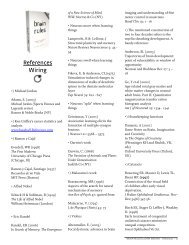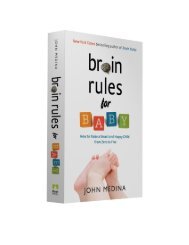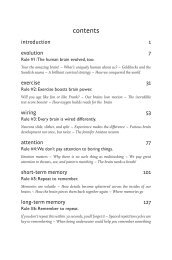Create successful ePaper yourself
Turn your PDF publications into a flip-book with our unique Google optimized e-Paper software.
in rules for<br />
pregnancy<br />
Healthy mom, healthy baby<br />
Key points<br />
• In the fi rst half of pregnancy, babies want to be left alone.<br />
• Don’t waste your money on products claiming to improve<br />
a preborn baby’s IQ, temperament, or personality. None of<br />
them have been proven to work.<br />
• In the second half of pregnancy, babies begin to perceive<br />
and process a great deal of sensory information. They<br />
can smell the perfume you wear and the garlic on the<br />
pizza you just ate.<br />
• The mother-to-be can boost baby brain development in<br />
four ways: gaining the proper weight, eating a balanced<br />
diet, exercising moderately, and reducing stress.<br />
www.brainrules.net
in rules for<br />
relationship<br />
Start with empathy<br />
Key points<br />
• More than 80 percent of couples experience a huge drop<br />
in marital quality during the transition to parenthood.<br />
• Hostility between parents can harm a newborn’s developing<br />
brain and nervous system.<br />
• Empathy reduces the hostility.<br />
• The four most common sources of marital turbulence are:<br />
sleep loss, social isolation, unequal distribution of household<br />
workload, and depression.<br />
www.brainrules.net
in rules for<br />
smart baby: seeds<br />
Feeling safe enables learning<br />
Key points<br />
• There are aspects of your child’s intelligence about which<br />
you can do nothing; the genetic contribution is about 50<br />
percent.<br />
• IQ is related to several important childhood outcomes,<br />
but it is only one measure of intellectual ability.<br />
• Intelligence has many ingredients, including a desire to<br />
explore, self-control, creativity, and communication skills.<br />
www.brainrules.net
in rules for<br />
smart baby: soil<br />
Face time, not screen time<br />
Key points<br />
• Here’s what helps learning: breast-feeding, talking to your children,<br />
guided play, and praising effort rather than intelligence.<br />
• The brain is more interested in surviving than in getting good<br />
grades in school.<br />
• Pressuring children to learn a subject before their brains are<br />
ready is only harmful.<br />
• Activities likely to hurt early learning include overexposure to<br />
television, learned helplessness, and being sedentary.<br />
www.brainrules.net
in rules for<br />
happy baby: seeds<br />
Make new friends but keep the old<br />
Key points<br />
• The single best predictor of happiness? Having friends.<br />
• Children who learn to regulate their emotions have deeper<br />
friendships than those who don’t.<br />
• No single area of the brain processes all emotions. Widely<br />
distributed neural networks play critical roles.<br />
• Emotions are incredibly important to the brain. They act like<br />
Post-it notes, helping the brain identify, fi lter, and prioritize.<br />
• There may be a genetic component to how happy your child<br />
can become.<br />
www.brainrules.net
in rules for<br />
happy baby: soil<br />
Labeling emotions calms big feelings<br />
Key points<br />
• Your infant needs you to watch, listen, and respond.<br />
• How parents deal with their toddlers’ intense emotions<br />
is a huge factor in how happy they will be as adults.<br />
• Children are happiest if their parents are demanding<br />
and warm.<br />
• Emotions should be acknowledged and named<br />
but not judged.<br />
www.brainrules.net
in rules for<br />
moral baby<br />
Firm discipline with a warm heart<br />
Key points<br />
• Your child has an innate sense of right and wrong.<br />
• In the brain, regions that process emotions and regions<br />
that guide decision-making work together to mediate<br />
moral awareness.<br />
• Moral behavior develops over time and requires a particular<br />
kind of guidance.<br />
• How parents handle rules is key: realistic, clear expectations;<br />
consistent, swift consequences for rule violation; and<br />
praise for good behavior.<br />
• Children are most likely to internalize moral behavior if<br />
parents explain why a rule and its consequences exist.<br />
www.brainrules.net
in rules for<br />
sleepy baby<br />
Test before you invest<br />
Key points<br />
• The central fact of newborn sleep is that it is nothing like<br />
adult sleep. Newborns only have two speeds: “active sleep”<br />
and “quiet sleep.” They ride the Tower of Terror.<br />
• There is no one-size-fits-all answer for sleep issues.<br />
• Do you think baby’s wants and the needs are the same thing<br />
during the fi rst year of life? Or not? It’s up to you. Science<br />
does not know which one you should choose.<br />
• Once baby is 6 months old, choose a plan for better sleep,<br />
evaluate your efforts, and then get ready to change your plan.<br />
www.brainrules.net


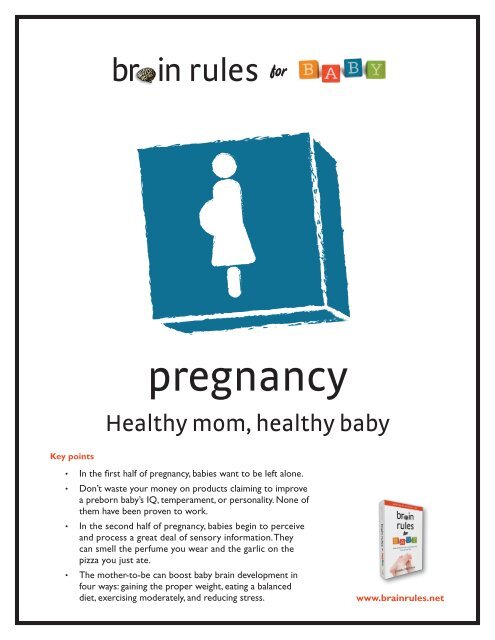
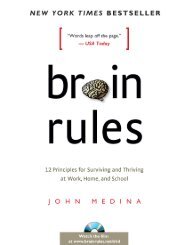
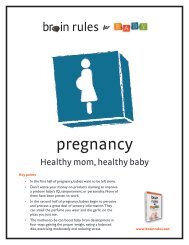
![Chapter Summaries [PDF] - Brain Rules](https://img.yumpu.com/45663759/1/172x260/chapter-summaries-pdf-brain-rules.jpg?quality=85)
